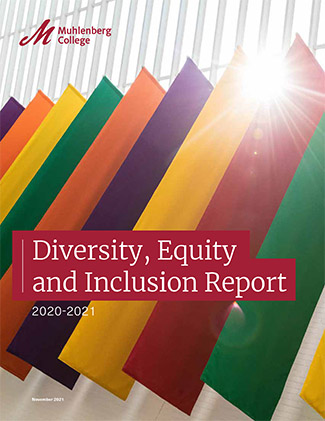Muhlenberg’s work toward a more inclusive and diverse campus is a continuous and evolving process. Milestones and accomplishments along the journey deserve recognition and can inspire each of us to continue our efforts to live up to our values and ideals.
Our progress is encouraging: The deliberate work of faculty and staff to enhance the diversity of the College’s faculty and student body is apparent. The incoming Class of 2025 is the most racially and economically diverse class in Muhlenberg history, and nearly half of the 26 new full-time faculty members identified as persons of color. Among this group are five Consortium for Faculty Diversity Fellows—the largest such cohort of Fellows ever hosted at Muhlenberg.
The annual Diversity, Equity and Inclusion Report offers an opportunity to review key events, activities and initiatives from the past year that highlight the ways in which the Muhlenberg community has made progress while providing encouragement for these continued efforts.
 Here are a few of the takeaways from this year’s report:
Here are a few of the takeaways from this year’s report:
- Search committees continue to receive training on inclusive and equitable hiring practices, including new cohorts of faculty and staff to serve as equity advocates during each search.
- Workshops, panels and reading and discussion groups around campus have begun to explore how departments and offices can implement antiracist practices, review existing processes and innovate curricula.
- Student leaders in orientation and resident advisor roles receive intensive diversity, equity and inclusion training to ensure they can support their first-year peers and beyond. Additionally, Student Advocates for Inclusion and Diversity (SAID) are trained to facilitate peer dialogues connected with the performance of the student-led Sedehi Diversity Project and with other student groups across campus.
- Campus events have been reflective of the larger, national conversation on racial and social justice with the presentation of events including “From The Ashes of Relentless Racial Crises Amid COVID-19,” and work led in part by the Asian Students Association to discuss the representation of Asian individuals in media and a related increase in violence and hate crimes.
- All academic departments have begun to review their curriculum through an antiracist lens. More than 20 faculty curricular and pedagogical development grants were awarded during the summer of 2021 to support this work. These efforts also involve work by the Academic Policy Committee about the potential implementation of a general race and power academic requirement.
- Efforts to support the diverse needs of the student body have continued in innovative ways. The Muhlenberg Extended Learning program allows up to 100 first-year students the opportunity to take a course online before they arrive on campus, helping to better acclimate them to Muhlenberg’s academics. Faculty and College offices have collaborated to create the Graduate School Preparatory Program, designed to help students from underrepresented groups navigate the graduate school research and application process. And financial hardship support was provided through access to emergency grants, use of the M.U.L.E. cabinet and more.
- Building an inclusive campus has led to priority funding for affinity groups and clearer support of diverse perspectives. Mental health care has expanded in important ways including the addition of counselors who have expertise in working with underrepresented populations and creating more safe spaces on campus.
- Muhlenberg is committed to being part of the nationwide discussion in higher education on improving campus diversity and inclusion. The College has become an active member in a number of organizations, including the Consortium for Faculty Diversity, the American Talent Initiative, the Liberal Arts Diversity Officers and the USC Race and Equity Center’s newly-developed Liberal Arts Colleges Racial Equity Leadership Alliance.
View the full 2020-2021 Diversity, Equity & Inclusion Annual Report.
